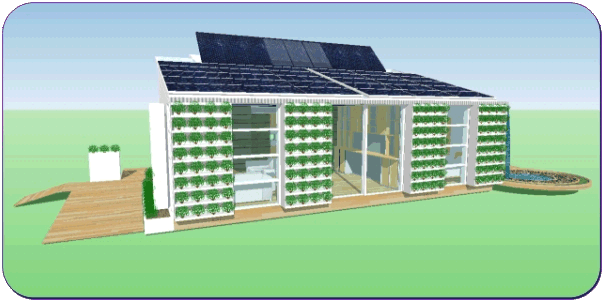

The MorningStar Home
The Penn State MorningStar Home
TECHNICAL INNOVATION AND DESIGN
- 800 Sq Ft. of Photovoltaic and Solar Thermal Collection
- Hydrogen Electrolyzer for Hydrogen Car Hookup
- Adjustable Roof PV Array
- Rainwater Catchment System
- Greywater Recylcing System
- Permanently Located at the Penn State Center for Sustainability
A conceptual design for the Morning Star Solar Home has been produced through a combined effort of students and faculty at Penn State. This process was largely guided by three factors: (1) The integration of multiple accessible and complimentary technologies in a hybrid format, which will advance the state-of-the-art in residential scale BIPV applications, (2) The permanent use of the facility as a laboratory for off-grid housing research, design and engineering, and (3) The deployment of the design concept on a larger scale with primary applications in rural communities and developing nations. The design will be guided by the requirements of the State College, PA climate and the use of the facility as an actual living laboratory, but with the design flexibility to be adaptable to a wide range of climates. In addition to these factors, the following guiding principals and strategies have been formulated for the Morning Star Solar Home.
- Student Safety and Welfare – Provide a safe and positive experience for all students involved in this primarily student-based activity.
- Form follows energy: sculpting an energy collector – Design geometry, architecture, material choices, and finishes to fully integrate and compliment the energy and mechanical systems.
- Technical core married with panelized envelope – Emphasize deployable and demountable systems around a mechanical core isolating technical components.
- Plug and play energy system features – Promote learning and experimentation through the incorporation of multiple technologies onto a test-bed that will facilitate a long term research program in hybrid energy systems for residential applications.
- Digital fabrication – Integrate CAD and digital design, fabrication, and construction for the development of prototypes, building features, and furniture.
- Energy dashboard and behavioral education – Provide feedback to occupants on real-time and historical energy use based on diagnostic and prognostic sensing and control systems.
- Cost Effective – Use technologies and a design that minimizes initial and lifecycle costs of the projected average homeowner in the year 2015 assuming a $0.10/kw levelized energy cost.
- Industry Standards – Promote the development of standards applicable to solar-hydrogen home construction of the future and the exploration of these standards in diverse applications.
Penn State Solar Decathlon Site
[Source] Pennsylvania State University Solar Decathlon Team Proposal PDF 1.48MB